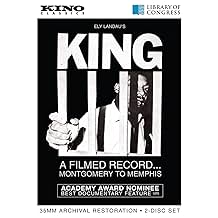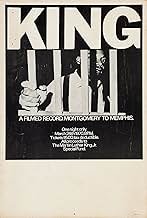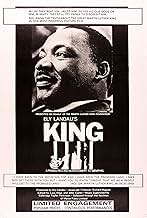Follows Martin Luther King's life and decades-long civil rights activism.Follows Martin Luther King's life and decades-long civil rights activism.Follows Martin Luther King's life and decades-long civil rights activism.
- Directors
- Writers
- Stars
- Nominated for 1 Oscar
- 1 win & 1 nomination total
Martin Luther King
- Self
- (archive footage)
Ralph Abernathy
- Self
- (archive footage)
James Baldwin
- Self
- (archive footage)
Tony Bennett
- Self
- (archive footage)
Leonard Bernstein
- Self
- (archive footage)
Marlon Brando
- Self
- (archive footage)
H. Rap Brown
- Self
- (archive footage)
- Directors
- Writers
- All cast & crew
- Production, box office & more at IMDbPro
Featured reviews
This movie consists almost entirely of documentary news footage of Dr. Martin Luther King, Jr.'s crusade for racial equality from the 1950s up to the time of his assassination in 1968. It features a wide diversity of gripping footage... interviews, sermons, marches, press conferences and speeches by Dr. King as he gradually secured basic rights and dignity for his people (and thereby for ALL people). As we sit here today, with prejudice remaining far too abundant in American society, it is nonetheless hard to believe that so much struggle and sacrifice was needed to secure what our Constitution and laws had already bestowed on all of our citizens long before Dr. King began his heroic effort.
Dr. King's inspiring oratory is a potent contrast to the hatred, bigotry and unrelenting brutality he and his followers faced time and again. Scenes of police violence and jeering white racists are sprinkled liberally throughout the film and are truly horrifying. The patience and nonviolence of the African-American protesters in the face of their oppressors is remarkable.
The film ends with Dr. King's funeral, an event that is foretold by Dr. King himself time and again in this film as he muses about the possibility of his death at the hands of his racist antagonists. In one such prophetic moment contained in the movie, Dr. King says:
"You know when I say 'Don't be afraid', you know what I really mean - don't even be afraid to die! But I submit to you tonight, no man is free if he fears death. But the minute you conquer the fear of death, at that moment, you are free. You must say, somehow, 'I don't have much money - I don't have much education - I may not able to be able to read or write - but I have the capacity to die!'"
The DVD is available from the distributor, Kino Lorber... don't even hesitate to buy it. This is a must-see film for anyone even remotely concerned about social justice or history.
Dr. King's inspiring oratory is a potent contrast to the hatred, bigotry and unrelenting brutality he and his followers faced time and again. Scenes of police violence and jeering white racists are sprinkled liberally throughout the film and are truly horrifying. The patience and nonviolence of the African-American protesters in the face of their oppressors is remarkable.
The film ends with Dr. King's funeral, an event that is foretold by Dr. King himself time and again in this film as he muses about the possibility of his death at the hands of his racist antagonists. In one such prophetic moment contained in the movie, Dr. King says:
"You know when I say 'Don't be afraid', you know what I really mean - don't even be afraid to die! But I submit to you tonight, no man is free if he fears death. But the minute you conquer the fear of death, at that moment, you are free. You must say, somehow, 'I don't have much money - I don't have much education - I may not able to be able to read or write - but I have the capacity to die!'"
The DVD is available from the distributor, Kino Lorber... don't even hesitate to buy it. This is a must-see film for anyone even remotely concerned about social justice or history.
11/18/17. A bit on the long side, but at least you get the chance to listen to the entire "I have a dream." No denying that King was a force to be reckoned with. His oratory style is reminiscent of the fiery preacher of past, and still quite effective in inspiring its listeners to bigger and better things.
10greg-253
After watching 103 minute edited version (the only celeb commentary by Harry Belefonte), one has to wonder why this film isn't more available to the general public. It is by far, one of the best documentary efforts to chronicle Martin Luther King Jr. as he helped push the civil rights movement forward into the public consciousness.
What makes this film special (in its condensed version) is the plainly laid out - but thoughtfully edited - chronology of Dr. King's various actions, speeches - and the public response. Other than Belafonte's opening statement, the film has no narration - which gives it an urgency. This is punctuated by King's powerful oratory (including the entire I Have A Dream speech...and segments of many others), along with footage of demonstrations, marches and material that is often hard to watch due to the racially charged violence.
Still, it is a potent reminder of our history - and should be seen by all.
What makes this film special (in its condensed version) is the plainly laid out - but thoughtfully edited - chronology of Dr. King's various actions, speeches - and the public response. Other than Belafonte's opening statement, the film has no narration - which gives it an urgency. This is punctuated by King's powerful oratory (including the entire I Have A Dream speech...and segments of many others), along with footage of demonstrations, marches and material that is often hard to watch due to the racially charged violence.
Still, it is a potent reminder of our history - and should be seen by all.
The version of this documentary I saw did not contain any of the celebrity "bridges" that Maltin mentioned in his review. The version I saw, ran only 103 minutes (as to the 185 of Maltin's version) and contained only archival footage of Dr. King's career from 1955 to 1968. This version is a pure video diary of King's speeches and marches. It contains amazingly powerful footage of the nonviolent protests and the final moments of King's life.
It's a documentary of Martin Luther King, Jr.'s life from 1955 to his death in 1968. Except for his first speech at the beginning of the Montgomery Bus Boycott, it is primarily news footage and coverage of his best-known activities during those years and the local circumstances that brought about those activities. The Montgomery speech is audio only. That is both its strength and limitation.
This film is one of the few places you can still see and hear the entirety of King's "I Have a Dream" speech of 1963. There are numerous other memorable speeches; seeing him deliver them visually dramatically increases the impact. It is so focused on King, however, that you don't get an overview of the Civil Rights movement, especially those parts in which he had a limited profile, such as the Freedom Rides in 1961.
There is nothing about King's personal life or the work of his associates. To get better context, you need the background of a good biography like Jonathan Eig's "King: a Life." But to be bathed in M. L. King's oratory, this three-hour film is the place to go.
Some celebrities narrate brief segments intermittently. They are a distraction and add nothing.
This film is one of the few places you can still see and hear the entirety of King's "I Have a Dream" speech of 1963. There are numerous other memorable speeches; seeing him deliver them visually dramatically increases the impact. It is so focused on King, however, that you don't get an overview of the Civil Rights movement, especially those parts in which he had a limited profile, such as the Freedom Rides in 1961.
There is nothing about King's personal life or the work of his associates. To get better context, you need the background of a good biography like Jonathan Eig's "King: a Life." But to be bathed in M. L. King's oratory, this three-hour film is the place to go.
Some celebrities narrate brief segments intermittently. They are a distraction and add nothing.
Did you know
- TriviaThis film originally was shown at theaters as a "one-time-only" event on 24 March 1970 and ran 3 hours and 5 minutes. The proceeds from the $5 admission price were donated to the Dr. Martin Luther King Jr. Special Fund. It was later shown on US television, unedited and with limited interruption.
- Alternate versionsA second version, edited down to 103 minutes, was released onto videotape. It is missing the celebrety narratives and an opening montage of clips of militant black leaders with violent rhetoric contrasting to clips of Dr. King's non-violent messages, but includes the original introduction by Harry Belefonte, and consists entirely of newsreel footage.
- ConnectionsFeatured in Is That Black Enough for You?!? (2022)
Details
- Release date
- Country of origin
- Language
- Also known as
- Dann war mein Leben nicht umsonst - Martin Luther King
- Filming locations
- Production company
- See more company credits at IMDbPro
- Runtime
- 3h 5m(185 min)
- Color
- Sound mix
- Aspect ratio
- 1.37 : 1
Contribute to this page
Suggest an edit or add missing content








































